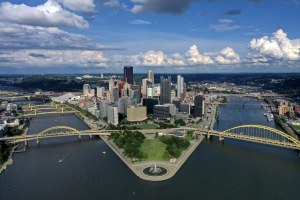The regeneration strategies of the former industrial areas of Pittsburgh in the US and Germany's Ruhr offer lessons for other regions in economic transition.
Industrial regions across the West have borne the brunt of global economic restructuring since the 1970s. Overwhelming forces such as globalized trade, the transition to a knowledge and service economy, accelerating automation and digitization, along with the rise of urbanized agglomeration economies, have restructured and relocated whole industries, and shifted capital and populations to fewer “winning” city regions, and away from the traditional industrial heartlands. At the same time, declining economic opportunity and yawning geographic inequality provide fertile ground for nationalist demagogues to connect with residents.
What are the strategies, then, that leaders of former industrial regions can initiate to avoid economic and social decline? Two regions to turn to for instruction are Germany’s Ruhr and the Pittsburgh metropolitan area in Pennsylvania. Both were the centers of their respective countries’ coal and steel industries throughout much of the 20th century and were symbols of their respective countries industrial might.
This working paper on the different experiences and strategies for regeneration pursued by the Ruhr and Pittsburgh region—similar in their industrial base and economic development arc—demonstrates the importance of transatlantic exchanges of practice. Pittsburgh's story illustrates how an industrial region can grow a dynamic high-tech economy, but at the cost of exacerbating regional inequality and polarization. The Ruhr's story shows how strategies to lessen the economic and social pain of deindustrialization likely reduced polarization and inequality, but the region has not been as successful at nurturing new jobs and business growth in specialized, high-valued added sectors.


